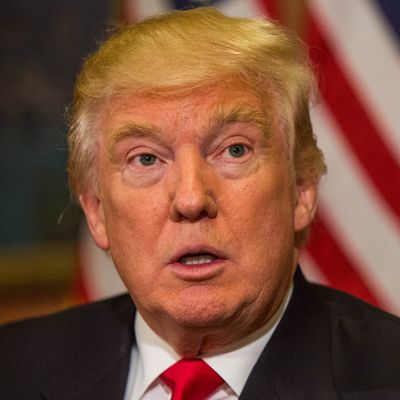
Donald Trump attended a roundtable discussion on his tax law Thursday, where he was supposed to sell the public on the virtues of his signature legislative achievement. So, naturally, he delivered a rambling disquisition on the (nonexistent) epidemic of rape among Central American migrants and the (also, nonexistent) plague of mass voter fraud that allows Democrats to rig elections.
“In many places, like California, the same person votes many times,” the president explained. “You probably heard about that. They always like to say ‘Oh, that’s a conspiracy theory.’ Not a conspiracy theory, folks. Millions and millions of people. And it’s very hard because the state guards their records. They don’t want [you] to see it.”
Shortly after the 2016 election, Trump announced that, “In addition to winning the Electoral College in a landslide, I won the popular vote if you deduct the millions of people who voted illegally.” At the time, it seemed likely that Trump was intentionally lying to protect his image in the eyes of his supporters. After all, even as the president-elect argued that the 2016 election was plagued by voter fraud massive enough to doom Republicans in countless down-ballot races, his lawyers were working to quash Jill Stein’s proposed recounts, arguing, “All available evidence suggests that the 2016 election was not tainted by fraud or mistake.”
And yet, it’s possible that Trump’s “mass voter fraud is not a conspiracy theory” conspiracy theory is less of a lie than a willful self-delusion: Trump has reportedly persisted in making the claim in private, over and over again, in meetings with friends and Republican congressional leaders — which is to say, people he has no plausible hope of actually persuading.
Nevertheless, Republicans were happy to use Trump’s conspiracy theory as a pretense for new voting restrictions that might insulate their party from the threat of poor and nonwhite voters. Thus, Kris Kobach’s voter fraud commission was formed. Unfortunately for fans of voter suppression, that commission was disbanded in January amid various lawsuits and resistance among state officials to honor Kobach’s data requests.
The fact that Trump is reviving the mass voter-fraud fiction now is a bit disconcerting. As a general rule, when the leader of a democratic nation announces that the opposition party is winning elections illegitimately, it’s reasonable to fear said nation’s democracy isn’t long for this Earth. That said, one can take some solace in the fact that Trump has yet to challenge the legitimacy of any specific special election that’s been held since he took office, including personally embarrassing Republican defeats, like Roy Moore’s in Alabama and Rick Saccone’s in Pennsylvania.
Of course, whether he would be willing to exercise such restraint after a much more personally embarrassing defeat in 2020 is far from certain (but the day that that becomes our top concern about Donald Trump will be a very fine day, indeed).






























